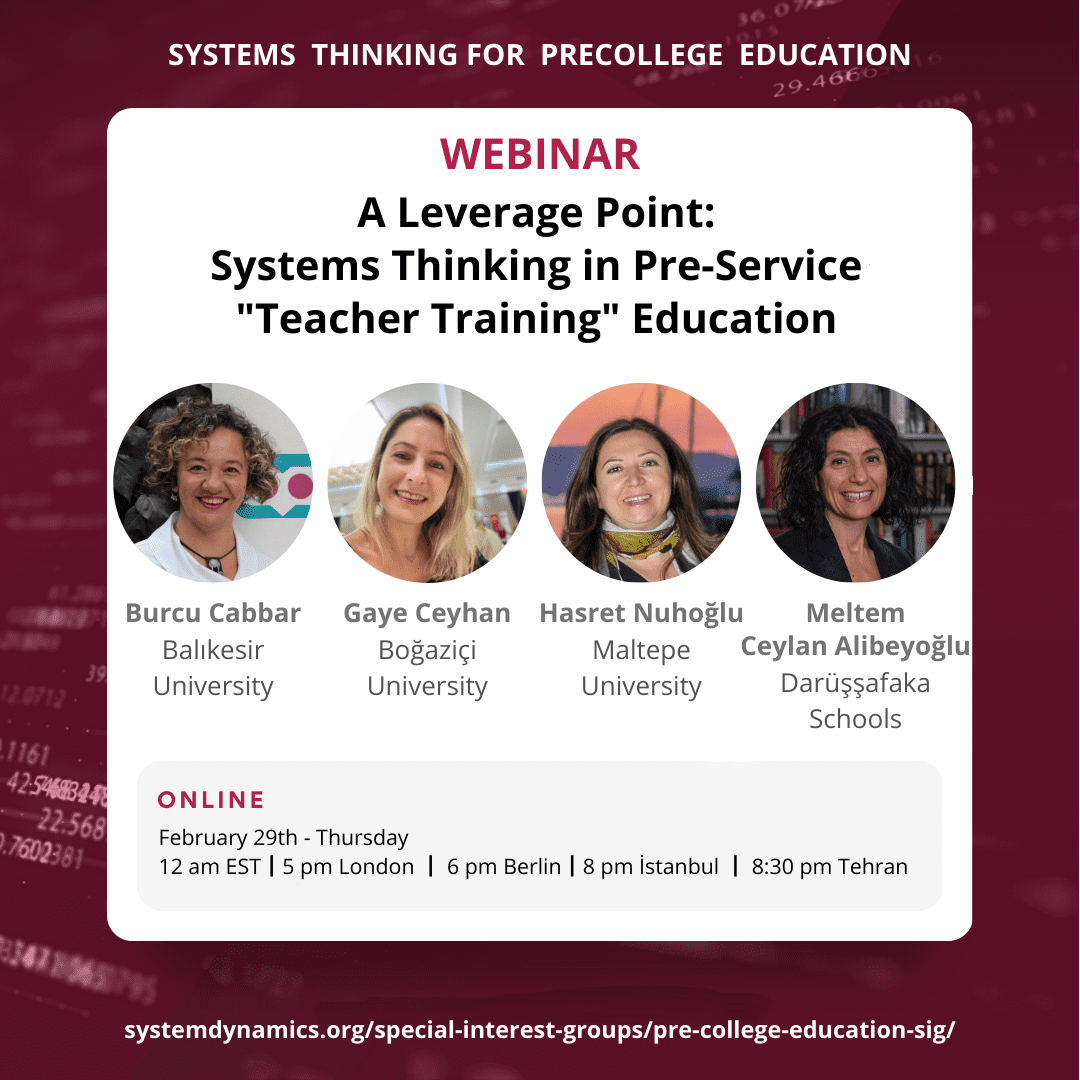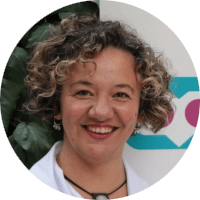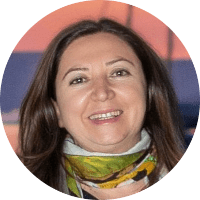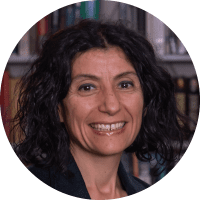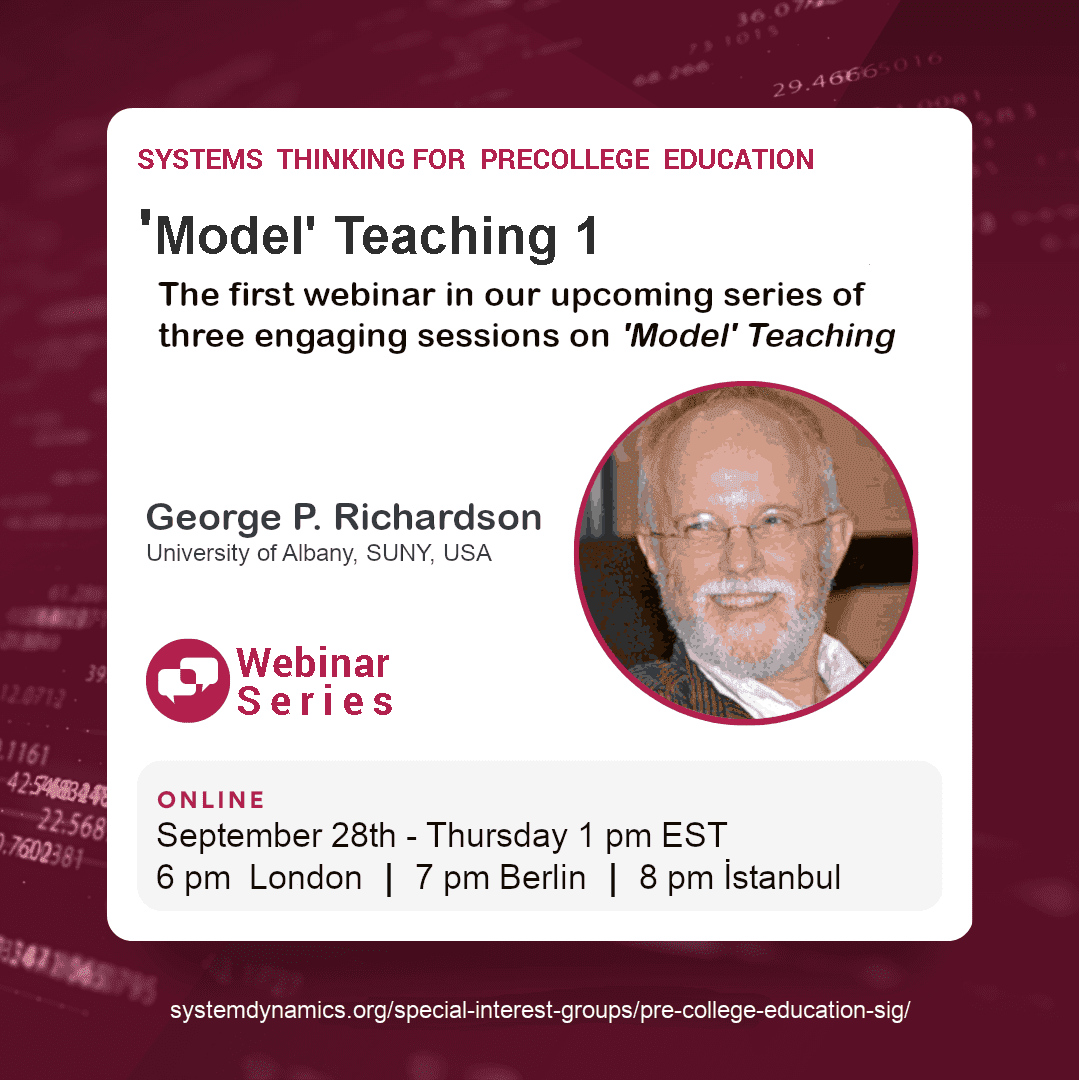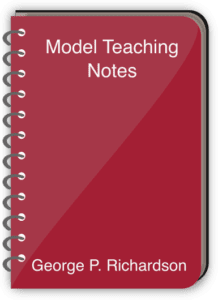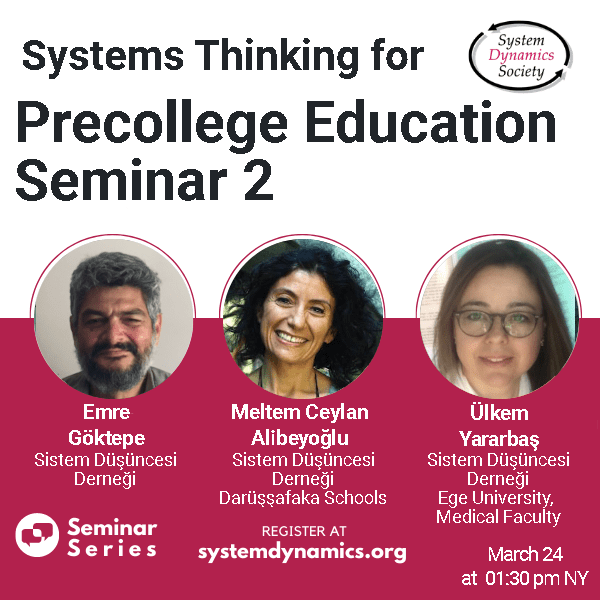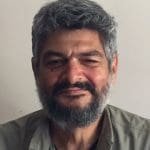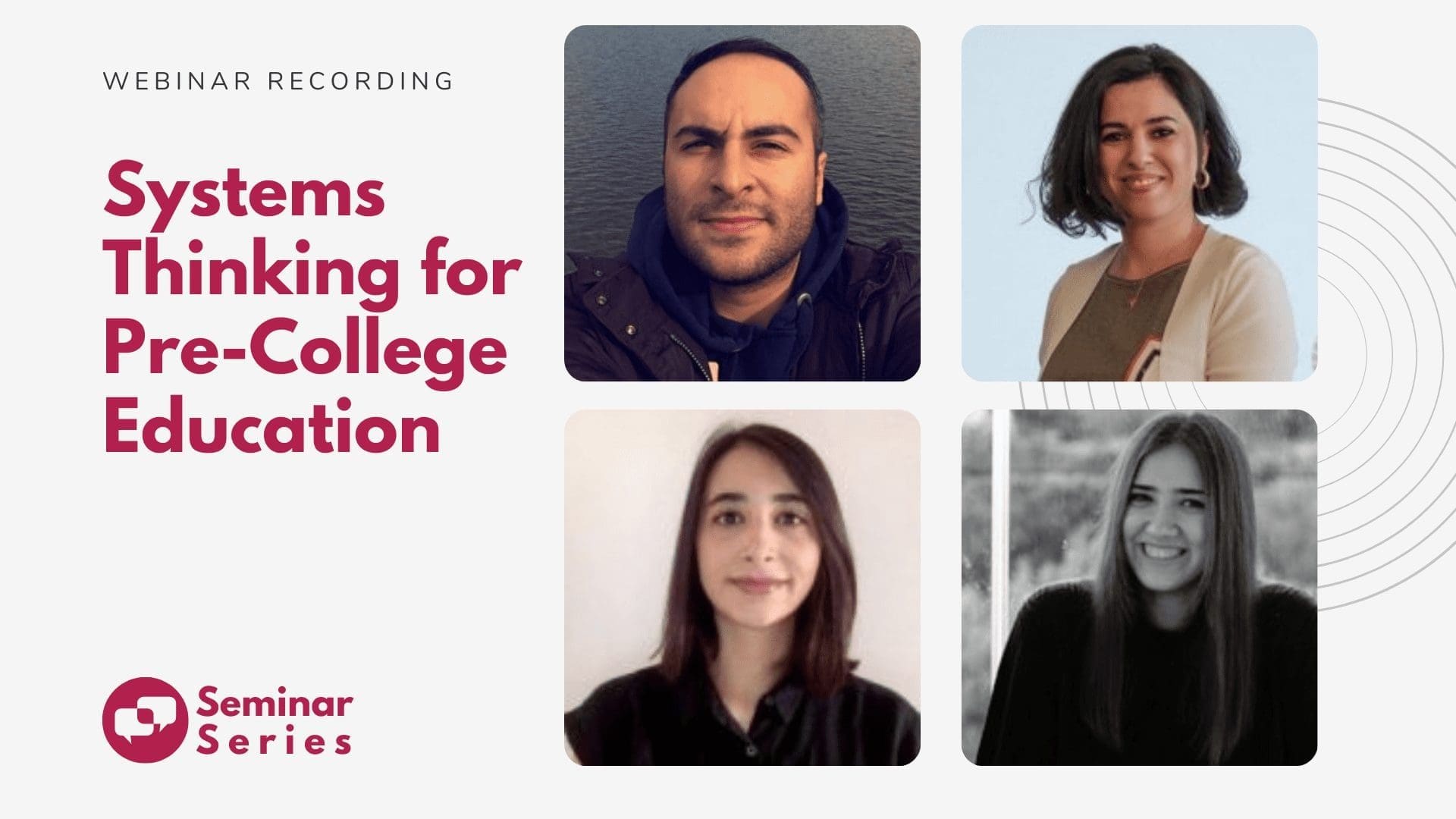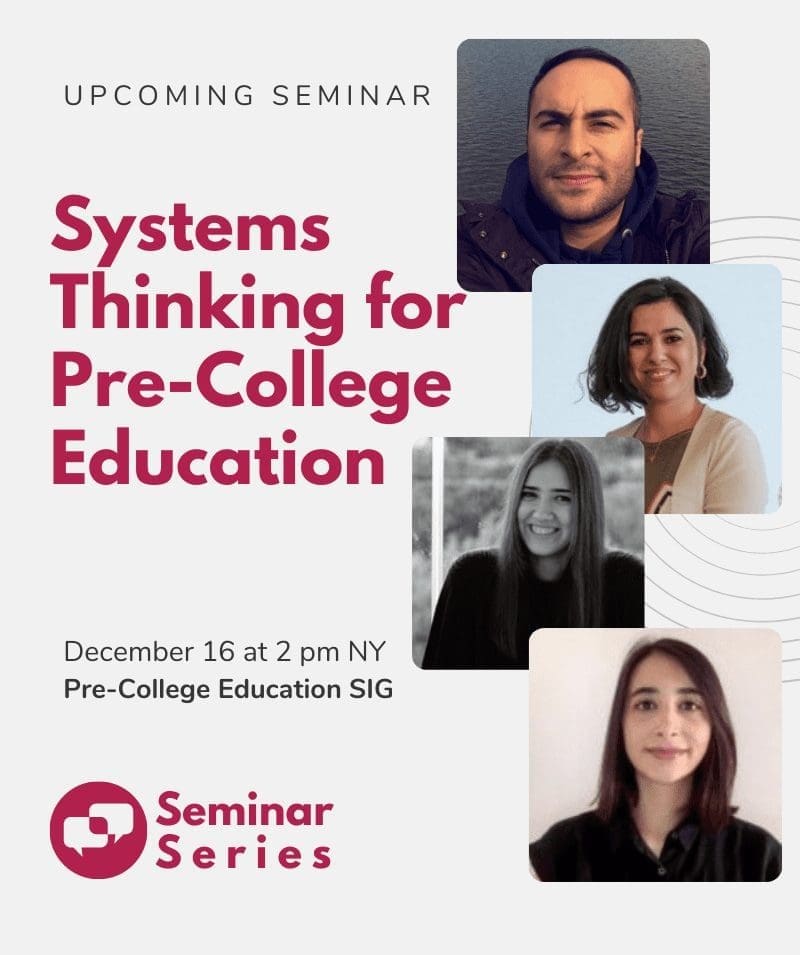A Leverage Point: Systems Thinking in Pre-Service “Teacher Training” Education
Dear Colleagues,
We are excited to invite you to our free webinar entitled ‘A Leverage Point: Systems Thinking in Pre-Service “Teacher Training” Education’ on Thursday, February 29, at 12:00 noon EST.
We consider courses that train pre-service precollege teachers to be one of the most critical places impacting in the formation of system citizens. The professors teaching these courses ultimately determine the criteria for topics and methods to be included within the curriculum and the criteria for student academic success.
The infusion of systems thinking in courses that train pre-service precollege teachers has the potential to be one of the most influential points on Donella Meadows’ list of places to intervene in a system, that is, the purpose of the system.
In this webinar, the experiences gained from the experiments carried out in precollege pre-service teacher training courses in Türkiye since 2019, the work done and plans for the future will be shared and a collaborative discussion environment will ensue where the presenters offer suggestions for those who want to undertake similar projects.
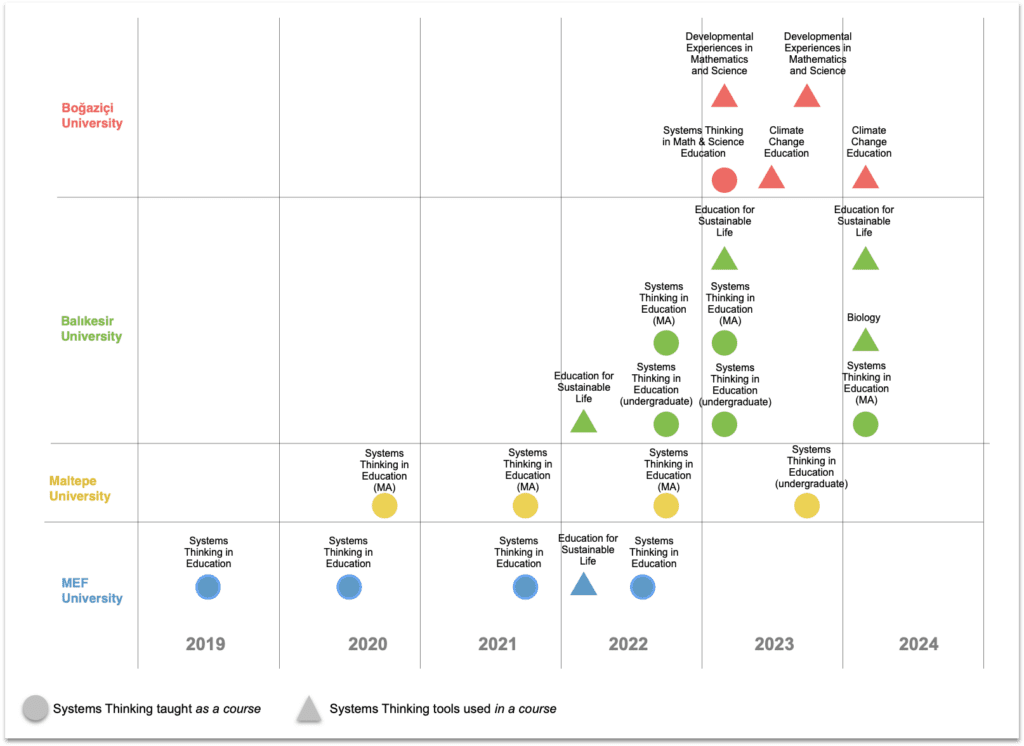 Timeline of courses where systems thinking is/was taught as a separate course (circle) or used as a tool in another course (triangle) by professors of education in Türkiye. Timeline of courses where systems thinking is/was taught as a separate course (circle) or used as a tool in another course (triangle) by professors of education in Türkiye. |
We strongly encourage you to come prepared with questions, contributions, suggestions, and ideas. Your insights will not only enrich the discussions but also provide a platform for collaborative learning and exploration.
We look forward to your active participation in this webinar. Let’s explore the world of systems dynamics together and uncover innovative ways to enhance education.
Best regards – the SIG leadership team.
| Diana Fisher Ülkem Yararbaş Burcu Güngör Cabbar Chang-Kwon (Benjamin) Chung Donald DeLand Ed Gallaher Emre Göktepe Gaye D. Ceyhan |
Matilde (Lin Ya) Hong Meltem C. Alibeyoğlu Prof. Dr. Min-Ren Yan Özgün Kurt Çetinkaya Sena Yıldız Değirmenci Steven Roderick Şebnem F. Gezer |
‘Model’ Teaching 1
We are excited to invite you to the first webinar in our upcoming series of three engaging sessions on ‘Model’ Teaching on Thursday, September 28, at 1:00 pm EST.
George Richardson, a world-class system dynamicist and educator, will guide participants through the core concepts and practical implications of systems dynamics model teaching. His extensive experience, particularly in working with K-12 teachers, ensures that the content will be both relevant and valuable for educators across different levels.
This series aims to provide:
- a starting place for people new to the art of teaching modeling,
- a source of ideas for teachers looking to advance what they’ve been doing,
- for experts in these arts who might enjoy a comparative look,
- some exchanges on pedagogy, which would benefit us all.
Before the first session of the series, we kindly ask participants to familiarize themselves with a 30-page set of notes prior to the webinar. These notes will serve as a foundation for the discussions, allowing you to contemplate how the models presented can be adapted to your specific settings or situations.
Please click here or on the image at below to access the notes.
The notes are a compilation of three papers previously published in System Dynamics Review. You can access the original articles using the links below:
- “Model” teaching:
https://onlinelibrary.wiley.com/doi/10.1002/sdr.1512 - “Model” teaching II: Examples for the early stages:
https://onlinelibrary.wiley.com/doi/10.1002/sdr.1520 - “Model” teaching III: Examples for the later stages:
https://onlinelibrary.wiley.com/doi/10.1002/sdr.1524
The workshop format of the webinar is designed to encourage active participation. We highly encourage you to come prepared with questions, contributions, suggestions, and ideas. Your insights will not only enrich the discussions but also provide a platform for collaborative learning and exploration.
We look forward to your active participation in this enlightening webinar series. Let’s explore the world of systems dynamics together and uncover innovative ways to enhance education.
Best regards – the SIG leadership team.
George P. Richardson
 George P. Richardson is Professor Emeritus of public administration, public policy, and information science at the Rockefeller College of Public Affairs and Policy at the State University of New York at Albany. He earned his doctorate under Jay Forrester at MIT and is the author of Introduction to System Dynamics Modeling with DYNAMO (1981) and Feedback Thought in Social Science and Systems Theory (1991), both of which were honored with the System Dynamics Society’s Forrester Award.
George P. Richardson is Professor Emeritus of public administration, public policy, and information science at the Rockefeller College of Public Affairs and Policy at the State University of New York at Albany. He earned his doctorate under Jay Forrester at MIT and is the author of Introduction to System Dynamics Modeling with DYNAMO (1981) and Feedback Thought in Social Science and Systems Theory (1991), both of which were honored with the System Dynamics Society’s Forrester Award.
George has played and sung acoustic folk music for sixty years. He has ridden a motorcycle cross-country from NY State to Seattle, the Olympic Peninsula, and down to Portland. He’s also ridden round-trip the fabled Dalton “Highway” from Calgary to Deadhorse, AK, and Prudhoe Bay, 300 miles north of the Arctic Circle. Both trips took less than sixty years.
The Pre-College SIG Webinar Series consists of periodic online presentations on K-12 education topics for Systems Thinking and System Dynamics communities. These virtual presentations cover a wide range of topics on K-12 education and bring together academics, teachers, and students for learning and lively discussion. Our webinars aim to promote and improve skills to effectively apply systems thinking and dynamic computer simulation in K-12 education.
All webinars and recordings are free for both SDS members and the general public. Please visit SDS Pre-College Education SIG page for previous webinar recordings.
Economics in K-12 Education Roundtable
We would like to invite you to attend our free webinar entitled Economics in K-12 Education Roundtable on Thursday, May 25, at 11:00 am EST. Our panel participants will be:
Murat Gökalp – Teacher of Mathematics and Economics in DP & MYP and TOK, Shanghai Community International School, Shanghai, China
David Wheat – Emeritus Professor of Economics and SD, University of Bergen, Norway
Erda Gerçek – Senior Lecturer in Economics and Strategic Thinking at Koç University, İstanbul, Türkiye
Khalid Saeed – Professor of Economics and System Dynamics at WPI, Worcester, Massachusetts, USA
We will discuss some the following questions:
- What might be the fundamental stocks in an economy?
- What might be the fundamental flows and flow cycles in an economy?
- What might be the fundamental causal loops in an economy?
- Which economic theories should be introduced, in which order?
- Can a historical approach (starting from hunter gatherers) be used in teaching economics?
- How can value, money, price, fiat be taught?
- Which approach should be used when teaching economics? What are the pros and cons of each approach?
- from micro to macro
- from macro to micro
- in paralel – a spiral education
- Should modeling accounting identities be introduced? If yes, how?
- Alternatively, Should Accounting System Dynamics be introduced? If yes, how?
- How should interconnectedness of economy and ecology be taught?
- circular economy, green economy, sustainability, new economy…
- What is or should be the goal of an economic system?
- What is or should be the function of an economic system?
We hope you will join us for this webinar.
Systems Thinking for Pre-College Education
Pre-College SIG Seminar Series consists of periodic online meetings on K-12 education to the Systems Thinking and System Dynamics communities. These virtual activities cover a wide range of topics on K-12 education from many subjects while bringing together academics, teachers, and students together for learning and lively discussion. Our seminars aim to promote and improve skills to effectively apply systems thinking and dynamic computer simulation to K-12 education. All seminars and recordings are free for both members and the general public.
You can watch the recording here
Systems Thinking for Pre-College Education
Systems Thinking for Pre-College Education
Pre-College SIG Seminar Series consists of periodic online meetings on K-12 education to the Systems Thinking and System Dynamics communities. These virtual activities cover a wide range of topics on K-12 education from many subjects while bringing together academics, teachers, and students together for learning and lively discussion. Our seminars aim to promote and improve skills to effectively apply systems thinking and dynamic computer simulation to K-12 education.
“Pre-schoolers as Systems Thinkers: Testing the Water”This study aims to cement the link between systems thinking (ST) and education for sustainability by presenting an example of systems education for young children. A learning framework was designed by developing a systems education guidebook focused on water and a learning framework based on the guidebook. The study was implemented over the course of four weeks with 32 children aged 5-6 in a pre-school in Turkey. To measure the outcomes, two ST assessment instruments (a shared reading and a concept mapping activity with interview protocols) were created. The children were pre-tested and post-tested with the assessment instruments using a mixed-method approach. The results revealed a significant development in the ST skills of the children. Children were more able to define system elements related to water and came to see invisible elements as parts of the system. The learning framework established high-quality causal relations between system elements related to water.
|
||||
“Understanding Composting with Systems Thinking”In this presentation, examples will be given of learning activities compatible with the Ministry of National Education (MONE) in Turkey and International Baccalaureate (IB) programs that seek to encourage a systems thinking approach and to develop a new way of understanding for primary years students(6-10 ages). For this activity, behavior over time graphs, stock-flow diagrams and ladders of inference were developed and used as systems thinking tools. During the activity, it was observed that the children were capable of viewing events with the tools provided, understanding these tools, and using them to engage with the subject matter. As a result, they were found to respond more clearly to the questions contained in the International Baccalaureate inquiry program and to be enthusiastic about taking action as individuals.
|
||||
“Teaching ‘Energy Conservation’ and ‘Household Waste’ with Systems Thinking Approach”In 2020-2021 school year, systems thinking based on system dynamics approach and tools (behavior over time graphs and stock-flow diagrams) were introduced in Darüşşafaka Middle School in Turkey. The aim of this prototyping project was to develop and apply activities compatible with outcomes of the Ministry of National Education in Turkey (MONE). In the long term, with tried and tested activities, it will be possible to offer MoNE to include systems thinking in the curriculum of education in Turkey. After training of voluntary science and math teachers on basic systems thinking concepts using Stella Online thru the summer of 2020, topics from the national education curriculum were selected and activities were developed for 6th, 7th and 8th grade. A similar approach is used for selecting students and delivering lessons. In this presentation 2 of these activities will be presented: Energy Conservation and Household Waste. We think these two activities are good examples for an introduction to systems thinking with simple numerical models.
|
Watch the recording below
org
Recent Posts
Call for Presenters: Seminar Series
Call for Presenters: Seminar Series We at the System Dynamics Society are continually seeking vibrant and knowledgeable presenters for our ongoing Seminar Series. As we unfold the calendar, there’s always a place for more insights, experiences, and expertise to enrich...
Honoring Excellence: A Glimpse into the Awards of the International System Dynamics Conference
Honoring Excellence: A Glimpse into the Awards of the International System Dynamics Conference The International System Dynamics Conference brings together experts, practitioners, and students to exchange ideas, showcase real-world applications, and celebrate...
From Bergen to Global: UiB’s System Dynamics Group
From Bergen to Global: UiB’s System Dynamics Group The System Dynamics Group, an autonomous research group at the University of Bergen (UiB) was established in 1971 by professor emeritus Svein Nordbotten. Inspired by the work of Jay W. Forrester, Nordbotten...
Upcoming Events

MIT System Dynamics Seminar | Approaches to Encouraging Health Exchange Participation
You are invited to attend the System Dynamics Seminar being held on Friday, April 26th from 12:30-2:00pm EST in the Jay W. Forrester conference room, E62-450, or via Zoom: https://mit.zoom.us/j/94114971874 (Password: SDSP24). Our guest speaker will be Soheil Ghili...
Recent Business cases
Solving Bottlenecks in Dairy Production Facilities with System Dynamics
Solving Bottlenecks in Dairy Production Facilities with System Dynamics EXECUTIVE Summary FrieslandCampina faced potential bottlenecks in production due to the merging of two factories. They hired SD&Co which employed system dynamics simulation models to predict...
A Design Value Calculator: A System Dynamics Boardgame
A Design Value Calculator: A System Dynamics Boardgame EXECUTIVE Summary Product design is a specific form of complex innovation that touches all areas of an organization’s management. While entrepreneurs recognise the value of design, they often tend to focus...
The World Bank Uses System Dynamics to Identify Root Causes of Poverty
The World Bank Uses System Dynamics to Identify Root Causes of Poverty EXECUTIVE Summary Madagascar has one of the highest poverty rates in the world. In 2022, an astonishingly three out of every four people in Madagascar lived below the poverty line. Poverty has...
Join us
Systems Thinking for Pre-College Education
Pre-College SIG Seminar Series consists of periodic online meetings on K-12 education to the Systems Thinking and System Dynamics communities. These virtual activities cover a wide range of topics on K-12 education from many subjects while bringing together academics, teachers, and students together for learning and lively discussion. Our seminars aim to promote and improve skills to effectively apply systems thinking and dynamic computer simulation to K-12 education. All seminars and recordings are free for both members and the general public.
“Pre-schoolers as Systems Thinkers: Testing the Water”This study aims to cement the link between systems thinking (ST) and education for sustainability by presenting an example of systems education for young children. A learning framework was designed by developing a systems education guidebook focused on water and a learning framework based on the guidebook. The study was implemented over the course of four weeks with 32 children aged 5-6 in a pre-school in Turkey. To measure the outcomes, two ST assessment instruments (a shared reading and a concept mapping activity with interview protocols) were created. The children were pre-tested and post-tested with the assessment instruments using a mixed-method approach. The results revealed a significant development in the ST skills of the children. Children were more able to define system elements related to water and came to see invisible elements as parts of the system. The learning framework established high-quality causal relations between system elements related to water.
|
||||
“Understanding Composting with Systems Thinking”In this presentation, examples will be given of learning activities compatible with the Ministry of National Education (MONE) in Turkey and International Baccalaureate (IB) programs that seek to encourage a systems thinking approach and to develop a new way of understanding for primary years students(6-10 ages). For this activity, behavior over time graphs, stock-flow diagrams and ladders of inference were developed and used as systems thinking tools. During the activity, it was observed that the children were capable of viewing events with the tools provided, understanding these tools, and using them to engage with the subject matter. As a result, they were found to respond more clearly to the questions contained in the International Baccalaureate inquiry program and to be enthusiastic about taking action as individuals.
|
||||
“Teaching ‘Energy Conservation’ and ‘Household Waste’ with Systems Thinking Approach”In 2020-2021 school year, systems thinking based on system dynamics approach and tools (behavior over time graphs and stock-flow diagrams) were introduced in Darüşşafaka Middle School in Turkey. The aim of this prototyping project was to develop and apply activities compatible with outcomes of the Ministry of National Education in Turkey (MONE). In the long term, with tried and tested activities, it will be possible to offer MoNE to include systems thinking in the curriculum of education in Turkey. After training of voluntary science and math teachers on basic systems thinking concepts using Stella Online thru the summer of 2020, topics from the national education curriculum were selected and activities were developed for 6th, 7th and 8th grade. A similar approach is used for selecting students and delivering lessons. In this presentation 2 of these activities will be presented: Energy Conservation and Household Waste. We think these two activities are good examples for an introduction to systems thinking with simple numerical models.
|

